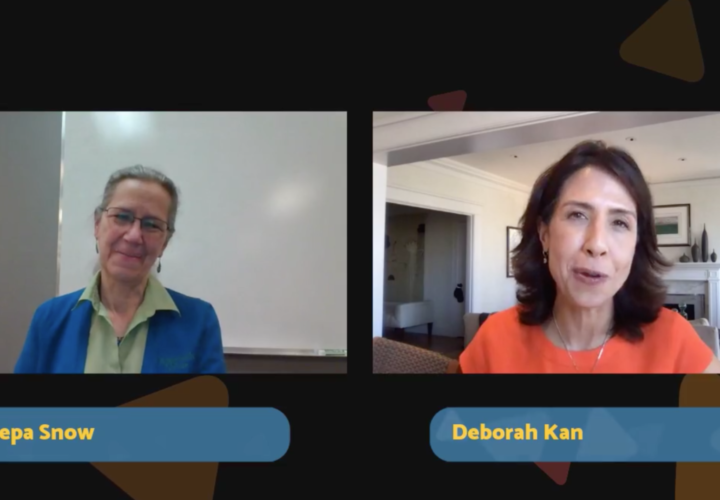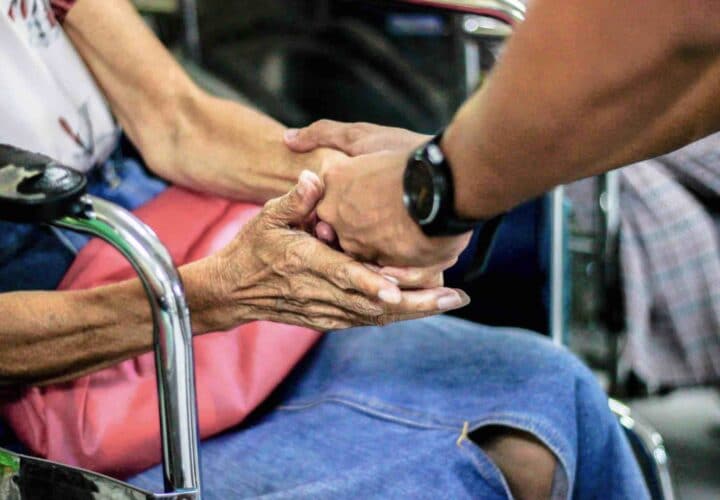How do you approach a situation in which a loved one with dementia is hoarding? Dementia caregiving expert Teepa Snow has the answers.
When Being Patient founder Deborah Kan’s mother began hoarding blueberry baskets and other miscellaneous items, Kan was taken aback by this new behavior. Kan’s mother, an organized and tidy person, had never shown signs of hoarding before her dementia diagnosis.
Hoarding, a somewhat common symptom of dementia, is often not talked about or given the same level of attention as more common symptoms like forgetfulness, sleep problems, and irritability. With little conversation surrounding hoarding, caregivers might be left wondering what brings on this unique symptom in the first place and how to address it gently with their loved one.
Hoarding can be an early sign of dementia. People with dementia often lose items due to memory loss, which can affect their ability to keep important items like financial statements, car keys, and passports safe or maintain an orderly living environment. If someone living with dementia misplaces an item, they might conclude someone has hidden it, or that someone is stealing from them.
These types of delusions can result in the person with Alzheimer’s to begin hoarding possessions as a way to make sense of their reality and feel comfort that they have items stockpiled. Sometimes hoarding and other behavioral changes can occur due to psychological changes in the brain caused by beta-amyloid plaque buildup, which causes cognitive impairment.
Dementia caregiving expert Teepa Snow is a fellow of the American Occupational Therapy Association and has helped thousands of dementia caregivers by sharing helpful lessons to her popular YouTube channel. When readers had the chance to ask Snow anything in a recent Q&A, one reader asked, “In the beginning stages of Alzheimer’s, how common is hoarding? And what can caregivers do about it?”
Snow said the answer dates back to a critical human survival skill. “Hunting and gathering is one of the most primitive things when you feel threatened, because you want to have something when there is nothing. To gather and to hoard and to keep, and to put it in a safe space, and to hide it from other people — that’s how you will know you have it when you need it,” said Snow.
Hoarding certain objects can bring a sense of security for some people living with Alzheimer’s at a time where there is a loss of control over other parts of their life. An inability to distinguish between items that should be kept or thrown away as certain cognitive abilities decline can quickly lead to a cluttered living environment. These behaviors can cause additional stress for caregivers like Kan.
“Hunting and gathering is one of the most
primitive things when you feel threatened,
because you want to have something when there is nothing.”
Snow offers advice to caregivers trying to stop their loved one from hoarding. “In those moments, one of the things that we want to think about is that taking things away or threatening to take things away will do nothing but drive it deeper and make it a more profound fear. So what you can say instead is, “Hey, Mom, I have a favor to ask. I noticed you have some magazines here. How about we see if we can organize those a little bit? Boy, look at that — you have The Times from 1967? I didn’t even know they had The Times in 1967.”
“And now all of a sudden, rather than seeing it as trash and hoarding, what’s happening is we’re looking at these things,” said Snow. “What I might do is take [some magazines from] the bottom of the pile and it can disappear, because I’m highlighting some of the things that are valued. I don’t want to do it in front of the person, but I do want to diminish some of the pile-up so that I have a safer space for someone to be in.”
Kan’s mother hoarded blueberry baskets specifically and reflecting on managing this as a caregiver, Kan asked Snow how she would approach the behavior herself.
Snow provided Kan with specific dialogue she could try in conversation with her mother, and said: “I would say, ‘Mom, I went to the food bank. One of the things they’re having trouble with is bags breaking. They were wondering if there’s any chance people had some baskets they could bring in, so when they gather this stuff up, it doesn’t break the bag. I thought, ‘Ah, my mom has some of those!’ I wonder if you’d be willing to donate a few, just a few, to the food bank because they really could use them.’”
Watch the rest of this hour-long conversation via our YouTube channel:





My wife was diagnosed with ALZ in 2016. She died from it on 4/1/2022. She was hoarding her mail for several years prior to her diagnosis. I found mail hidden all over the house after her death. A lot of this info and advice was scarce or non-existent back at the start of her disease. I was her primary caregiver.
Hi Tim, thank you for being here. Hoarding is often not talked about or given the same level of attention as more common symptoms like forgetfulness, sleep problems, and irritability. We’re glad you found the article useful. Take care!